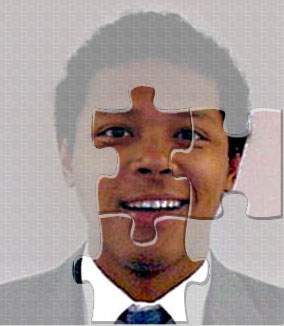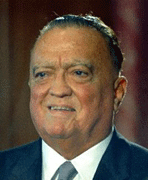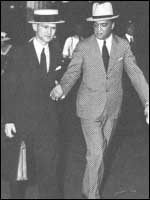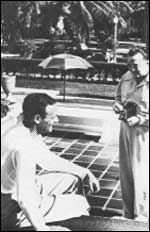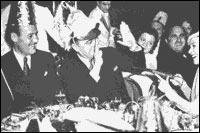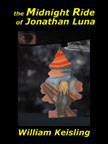Part 3 - Chapter 11
‘Everything Secret Degenerates:
The FBI’s Use of Murderers as Informants’
Jonathan Luna, it turns out, kept company with a troubled organization that has increasingly acted with lawlessness, deceit and dishonor. This organization has grown into an almost secret society, acting often in an un-American fashion, in the dark, without proper oversight. This organization has been known to intimidate, threaten, and destroy the innocent lives of any who stand up to it. It's an organization that has spent years trying to keep its agents' worst deeds — including murder, rape, theft, deceit and child molestation — away from public scrutiny.
In the weeks surrounding Jonathan Luna's disappearance and murder, troubling reports about this organization began dripping into the public consciousness. These steady drips seem to build to a torrent.
Luna's own dealings with this organization, had they come to light, undoubtedly would have sparked more trouble for Luna, the organization, and its agents.
In February 2004, Republican U.S. Senator Charles Grassley, of Iowa, would make public a report detailing what he angrily called the "shocking" activities of this organization.
"The shocking report is a laundry list of horrors," Senator Grassley would write, "with examples of agents who committed rape, sexual crimes against children, other sexual deviance and misconduct, attempted murder of a spouse, and narcotics violations, among many others."
The name of this organization? The Federal Bureau of Investigation, or the FBI. It's a division of the U.S. Justice Department.Jonathan Luna's murder fell in a period that produced amazing revelations about deep, systemic and enduring scandalous behavior within the FBI and the Justice Department. These revelations serve to detail unimaginably dreadful stories involving FBI agents and their informants. These seem to dovetail with problems Luna was having with his own stable of FBI agents.
Less than two weeks before Luna's murder, in late November 2003, the first in a series of revelations about FBI misconduct was released by the House Committee on Government Reform. The committee would title their report, with a nod to Lord Acton, "Everything Secret Degenerates: The FBI's Use of Murderers as Informants." The report is must reading, not only for those interested in the Luna case, but for all who are concerned for the United States, and concerned with the state of free societies in the world today.
The cover from the 2004 congressional report, "Everything secret Degenerates: The FBI's Use of Murderers as Informants."
Click to view full-size cover (+)
Click here to download the full congressional report.
In hearings held into the summer of 2003, the committee gathered evidence of almost unimaginable FBI misconduct in Boston, Massachusetts. The hearings were sparked by revelations that four men were tried and convicted for a murder the FBI knew the men did not commit.
The committee ended up learning the FBI in Boston kept murderers on the payroll as informants for three decades, from the mid-1960s into the mid-1990s and beyond. More than twenty people were killed by the FBI informants from 1965 on, often with the help of FBI agents, the government now reports. The FBI clearly knew some of its informants were aspiring murderers. At least one ex-agent planned and carried out a murder with the help of his former informant and the Mafia, in a conspiracy to protect mob skimming activities. This agent was protected from prosecution for twenty years.Boston FBI agents, the committee's report says, helped their informants commit murder, and stood by silently while innocent men were convicted of the crimes. All this was done to protect the FBI's informant operations, with the approval of Director J. Edgar Hoover.
The FBI's decades-long policy had "disastrous consequences," the congressional report says, and "must be considered one of the greatest failures in the history of federal law enforcement."
The FBI's horror-show in Boston began when then-Director Hoover belatedly decided to go after the Mafia, after years spent denying the Mafia even existed, the report notes.Why had Hoover for decades protected the mob? The question really is, why, in the early 1960s, did the FBI suddenly change course? The answer's obvious. Hoover's boss, Attorney General Robert F. Kennedy, made it his department's mission to go after the mob.
The committee relates:For decades, FBI Director J. Edgar Hoover publicly maintained that there was no such thing as organized crime. As Hoover's long-time aide Cartha ''Deke'' DeLoach pointed out (in his book, Hoover's FBI: The Inside Story):
"Despite this now-familiar history of the mob in America, it surprises most people to learn that from the early 1930s until 1957, J. Edgar Hoover had insisted that there was no such thing as La Cosa Nostra—that is, a network of interrelated mobs that coordinated activities and maintained a kind of corporate discipline. . . . His profound contempt of the criminal mind, combined with his enormous faith in the agency he created, persuaded him that no such complex national criminal organization could exist without him knowing about it. He didn't know about it; ergo it did not exist."
J. Edgar Hoover
So, comrades, the official version is that Hoover saw himself as a colossus bestriding the world, his profound contempt for the criminal mind unable to fathom the possible existence of the mob.
No one of course buys this. Call it a fairy tale. Politicians knew that Hoover stayed in power by collecting garbage and not-too-subtly blackmailing anyone and everyone in power.
Lyndon Johnson famously appraised the situation by observing it was better to have Hoover inside the tent pissing out, than outside the tent pissing in.
Everybody here had Hoover's knife to his throat — Jack, Martin Luther King, Lyndon and Dick — and just about everyone went down but Hoover. Hoover died in office in 1972. That said, it's interesting to note that, in death, Hoover's reputation has suffered more than the others. He's come to represent the very worst the United States had to offer in the third quarter of the twentieth century. That's J. Edgar Hoover's public legacy.Hoover's great accomplishment was building an independent law enforcement agency aloof from the political pressures of the White House, Congress, and the Justice Department. That is a worthy goal. Unfortunately it wasn't his lasting legacy.
When Hoover needed to get around political roadblocks, or bolster his or the agency's reputation, he would go to the press. Hoover, in his early years, used the press like no other public figure. He carefully crafted a persona as the untouchable G-Man who'd brought down John Dillinger.
Purvis and Hoover
In fact, Dillinger was shot to death in 1934 by a team of G-Men led by field Agent Melvin Purvis. Following Dillinger's death in a hail of bullets in front of a Chicago movie theater, plain-speaking Purvis's popularity eclipsed that of Hoover's.
A jealous and threatened Hoover proceeded to hound Purvis out of the bureau. Hoover assigned Purvis to bad cases and subjected him to intense internal investigations. Purvis left the bureau within the year, and Hoover prevented him from ever again working in law enforcement. Purvis died in 1960, a victim of a bullet fired from a .45 automatic ironically given to him by fellow FBI agents when he resigned from the bureau. Suicide was suspected, though Purvis was later thought to have died trying to remove a stuck tracer bullet from the gun.
"No one employee of this Division can be responsible for the successful termination of any one case... Through cooperative efforts a case is broken," became Hoover's dictum. And so was born the image of the bureau as Borg, the Star Trek machine nemesis who act as one, and dress alike, talk alike, and think alike. Led by an all-seeing, all-connected, Hydra-headed grotesque — Hoover.
The point I'd like to make is that leaking to, and cultivating, the press from the beginning was a potent weapon in Hoover's FBI arsenal.
Hoover taught his agents the importance of going straight to the public.
Clyde Tolson and J. Edgar Hoover relax on vacation (top), and at the Stork Club in New York City (bottom).
Hoover is buried a few yards away from his longtime FBI associate director, and inseparable companion, Clyde Tolson, who in 1975 followed John Edgar to the grave. Hoover willed his estate to Tolson, who'd also moved into Hoover's home. Hoover left behind files on everyone from Albert Einstein to Frank Sinatra to Dwight Eisenhower to Louie Armstrong and John Lennon.
While Hoover still lay in state in the Capitol rotunda, President Richard Nixon sent L. Patrick Gray III to the bureau to ask for Hoover's "secret" files. There ensued an angry face-off with bureau employees. Tolson and Hoover's longtime secretary, Helen Gandy, told Gray there were no secret files, and sent Gray away.
Within a few hours Nixon selected Gray to replace Hoover as acting FBI director. Nixon elected to pass over many career FBI men, including Tolson and number three man, W. Mark Felt, a quintessential FBI man. This may have been Nixon's undoing.Clyde Tolson and secretary Gandy resigned after Hoover's funeral, taking with them, it's said, some of Hoover's files, while the rest went to Felt. (The teamsters probably had to be called in to truck away the file on Nixon.) Felt remained on as Gray's associate director, so was ironically seen within the bureau as Nixon's political pawn.
Over the decades, Felt has risen to the top of many lists (including Nixon's) as a candidate for Watergate double-crossing informant Deep Throat. Washington Post reporter Bob Woodward knew Felt from Woodward's days at Yale, theorists suggest, when Felt was an FBI recruiter on campus. Later, in the Navy, Woodward served in Quantico, Virginia, where Felt also worked as director of an FBI training center. (It turns out that Woodward met Felt in the basement of the White House in 1970, when Woodward, then a young lieutenant in the Navy, was delivering documents.)
Woodward has said he won't reveal the identity of Deep Throat until the world's most famous informant is dead. The way it should be. At this writing, Felt is an octogenarian living in retirement in California. (Editor's note: On May 31, 2005, The Washington Post revealed that Felt was, in fact, Deep Throat.)
In 1999, Felt denied to online Slate magazine that he was Deep Throat. Wouldn't he be a hero is he was? Felt was asked.
"That's not my view at all," Felt whistled. "It would be contrary to my responsibility as a loyal employee of the FBI to leak information."
Felt obviously wasn't working on the Luna investigation.
In reality, Felt was known as a careful cultivator of reporters and a deft practitioner of the casually dropped press leak, as taught by Hoover. Felt was regarded by reporters as someone accessible within the bureau. While his personal motives have been called into question, it's known that Felt resented the political pressure applied to the bureau from Nixon's White House to quash the Watergate investigation. It wouldn't have happened under Hoover, Felt knew. It threatened the bureau's independence, and could only lead to the bureau becoming a political enforcement arm of the White House. That is, an all-powerful, national police force under control of the White House, used to punish political enemies.
While the bureau, left to its own devices, certainly wasn't shy to spy domestically, to its credit it resisted some of the worst domestic intelligence-gathering schemes of the Nixon White House. These included the "Huston Plan," designed to expand domestic intelligence gathering using informants, mail openings, buggings and break-ins.
Felt and two other career bureau men famously confronted Gray, and insisted they would interview an attorney who'd deposited money from a secret slush fund into a Watergate burglar's bank account. Nixon had put the CIA up to telling the FBI that this was a matter of national security and should be left alone.
The press, and the public seeing what was going on, turned out to be the only means of ensuring an investigation.
Hoover and Nixon
Knowing too much, and suspected of leaking, Associate Director Mark Felt's life was in danger. Another FBI informant was informing on Felt. It's interesting to recall Woodward's description of Deep Throat in All the President's Men, looking over his shoulder in parking garages. Had Deep Throat been an FBI agent, J. Edgar Hoover had done something right, and one of the agents he had trained had come forward during one of the deepest crises in American democracy.
The transcript of one Watergate tape, dated October 19, 1972, doesn't leave much to the imagination. Nixon makes a chilling suggestion that aide H.R. Haldeman pretends not to hear. It's six months after Hoover's death and four months after the Watergate break-in:Nixon: Well, if they've got a leak down at the FBI, why the hell can't Gray tell us what the hell is left? You know what I mean?...
Haldeman: We know what's left, and we know who leaked it.
Nixon: Somebody in the FBI?
Haldeman: Yes, sir. Mark Felt. You can't say anything about this because it will screw up our source and there's a real concern. Mitchell is the only one who knows about this and he feels strongly that we better not do anything because—
Nixon: Do anything? Never.
Haldeman: If we move on him, he'll go out and unload everything. He knows everything that's to be known in the FBI. He has access to absolutely everything ...
Nixon: What would you do with Felt?
Haldeman: Well, I asked Dean ...
Nixon: You know what I'd do with him, the bastard? Well that's all I want to hear about it.(Emphasis mine.) This piece of transcript became famous for what immediately follows. Nixon's thoughts for some reason turn to religion. Here we see the darkest corners of Nixon's mind critiquing Hoover's staffing decisions. He inquires about Felt's religious affiliation:
Nixon: Is he Catholic?
Haldeman: (unintelligible) Jewish.
President Nixon: Christ, put a Jew in there?
Haldeman: Well, that could explain it too.The definitive study of the identity of Deep Throat, incidentally, is widely considered to have been written by Woodward's one-time Post colleague, James Mann, who published in the May 1992 issue of The Atlantic. Mann points out that the bureaucratic squabbles between the FBI and Nixon's White House had roots in a corruption scandal in the Washington DC police force.
"Some members of the D.C. vice squad had been found to have been involved in gambling and prostitution, and there were allegations that others had ties to narcotics figures," Mann recalls. Shades of today's Baltimore police woes. In an effort to go around Hoover's FBI, Nixon planned to groom the compromised DC police chief, Jerry V. Wilson, to succeed Hoover as FBI director. Chief Wilson was more pliant to the whims of politicians than Hoover. Hoover's G-men torpedoed that boat, with the help of adroit leaks to the Washington Post, by disclosing grand jury investigations of the DC police force, and casting doubts on Chief Wilson's integrity. Here we see parallels with Maryland's indicted-for-romance Police Superintendent Ed Norris, the politicians' darling. Most interestingly, Mann writes:Wilson's police force was everything the FBI was not: it espoused a belief in the need for more progressive law-enforcement techniques, and it got along well with the Administration. The D.C. police hired minority members, women, and even a handful of "Ivy League cops" — young college graduates who were eager to learn about law enforcement at the street level. These personnel practices were intensely mistrusted by the FBI.
In the FBI culture, Jonathan Luna -- black, well educated, independent -- embodied everything the bureau historically despised and mistrusted.
It's worthy to note that the time-honored FBI tradition of the press leak was misused in the death of Jonathan Luna. One seems hard pressed to imagine how a dead Luna could possibly be a threat to the political independence of the agency, and be deserving of such a torrent of leaked attacks. But maybe, due to the FBI's heroin dealing informant Warren Grace, that's precisely the case.
Most significantly, leaks in Luna's case weren't used to ensure an investigation. Leaks in the Luna case were used in an attempt to kill the investigation.This is an excerpt from the book The Midnight Ride of Jonathan Luna, by William Keisling. © 2004-2007 William Keisling. All rights reserved.
Click here to return to the main Luna page >>
